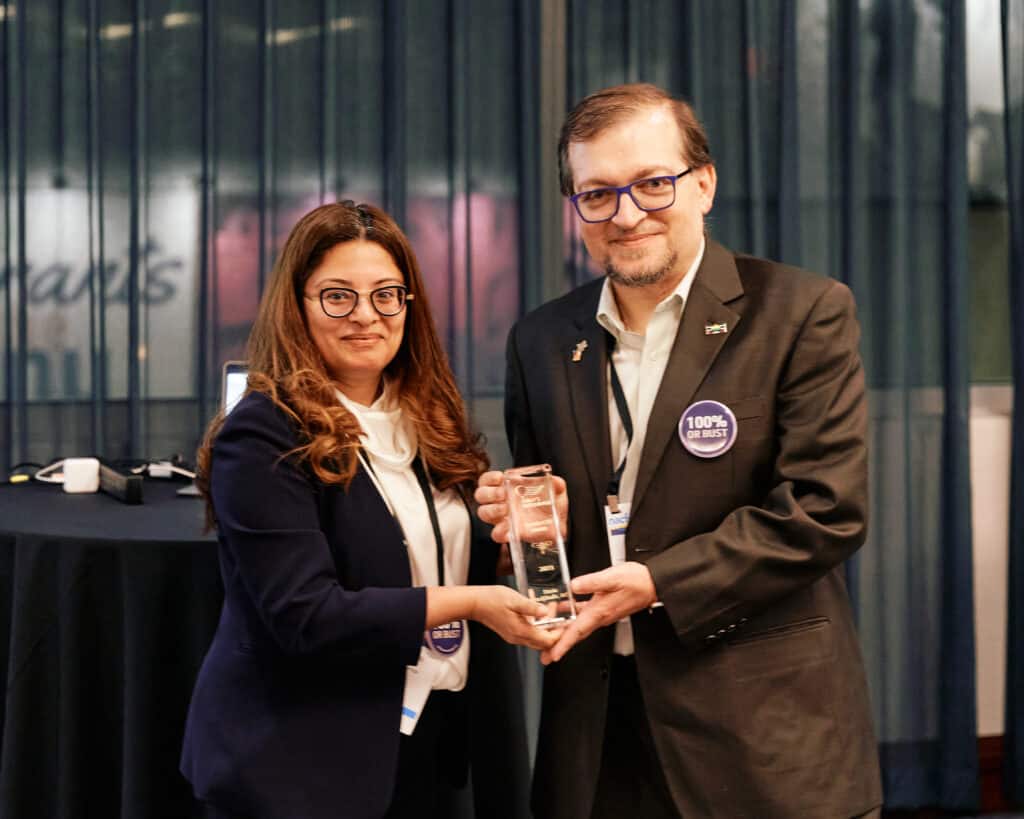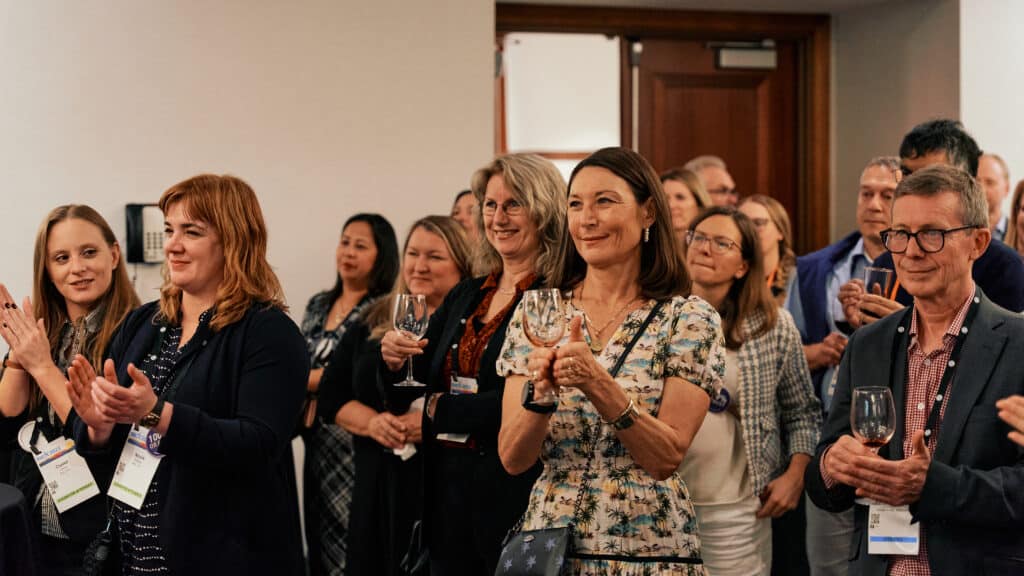NACFC 2023: Key Takeaways in Cystic Fibrosis Research
by Chandra Ghose, PhD, EE’s Chief Scientific Officer
The North American Cystic Fibrosis Conference (NACFC) 2023, held in November in Phoenix, AZ, left the global cystic fibrosis (CF) community with renewed excitement and energy. The annual, highly-anticipated meeting is a melting pot of researchers, healthcare professionals, and advocates dedicated to advancing research, care, and drug development for the treatment of CF. This year’s conference showcased groundbreaking research, novel therapies, and collaborative efforts that promise to reshape the landscape of CF care.

This year, we also hosted our 6th Annual Emily’s Entourage (EE) cocktail reception at NACFC, bringing together over 130 researchers, clinicians, industry representatives, and community members. The event featured the presentation of the 2023 Trailblazer Award, which recognizes innovative changemakers in CF research, drug development, and care, to EE Scientific Advisory Board member, Denis Hadjiliadis, MD. The event also included brief remarks from EE co-founders, Emily Kramer-Golinkoff and Liza Kramer, who participated virtually due to infection precautions given the advanced stages of Emily’s CF.

In addition to the reception, EE also sponsored a kiosk in the exhibition hall for the second year in a row to share more about our mission and work. Folks that visited our kiosk picked up our popular “100% or Bust” pins! We loved seeing people wearing the pins throughout the event.
Now that NACFC has come and gone, I’d like to share some of my most compelling scientific takeaways from the conference:
Precision Medicine Takes Center Stage
NACFC 2023’s presentations and plenary sessions highlighted significant strides made in the realm of precision medicine for CF. Researchers from academic and medical institutions, as well as biotechnology and pharmaceutical companies, presented data on personalized treatment approaches designed to address individual genetic variations such as theratyping and the use of organoids, paving the way for more targeted and effective therapies with the potential to reach the final 10% of the CF community who do not benefit from existing modulator therapies. Increasing research and drug development in gene-editing technologies and CRISPR-Cas9 applications showcased the potential to correct underlying genetic defects responsible for CF and other genetic diseases.
- Related session: PL1- Genetic Therapies for All: Harnessing Cross-Disease Knowledge for Breakthroughs in CF (Speakers: Dr. Alexis Thompson and Dr. Paul McCray)
Advancements in CFTR Modulators and Other Novel Approaches
CFTR modulators target the defective CFTR protein responsible for CF and have been a game-changer in CF treatment. The conference featured updates on the latest generation of modulators, demonstrating enhanced efficacy and fewer side effects. These advancements offer hope for a broader range of individuals with CF, including those with rare CFTR mutations.
- Related presentation: W-22 Interim Results of an Open-Label Trial to Evaluate ETI in Individuals with CF and an N1303K Mutation Who Are Not Eligible for Modulator Treatment. (Speaker: Dr. George Solomon)
Therapeutic Approaches Beyond CFTR Modulators
Novel approaches beyond CFTR modulators are entering clinical trials, such as the molecular prosthetics approach pioneered by cystetic Medicines. The company announced they had dosed the first person with CF in an ongoing Phase 1 clinical trial (NCT05802264) of its investigational inhalable small molecule therapy CM001. Of note, the early-stage research behind cystetic Medicines was originally supported with a grant from EE, which enabled the team to spin out the company, eventually securing $32 million in financing from Deerfield Management to develop the treatment into a new therapy.
- Related presentation: S-14: CM001, a Clinical Stage Molecular Prosthetic for CFTR that May Benefit All People with CF. (Speaker: Dr. Marty Burke)
Innovative Gene Therapy Approaches
Exciting developments in gene therapy were also unveiled at NACFC that could potentially have a significant impact for the entire CF population, including those with rare or nonsense mutations. Researchers shared promising results from exploring the use of viral vectors and novel nanoparticles to deliver corrective genes to cells affected by CF. By replacing the genetic mutation with a “correct version” of the CFTR gene, gene therapies work by addressing the root cause of CF, thus offering a potentially permanent cure and a treatment with the potential to reach all people with CF, regardless of genetic mutation.
- Related presentations: S11.2 Vehicles of Viral Vector Delivery to the Airways (Speaker: Dr. Patrick Sinn)
- S11.4 Polymeric Nanoparticle Strategies to Overcome Barriers for Systemic CF Gene Therapy. (Speaker: Dr. Alexandra Piotrowski-Daspit)
- S11.3 Overcoming Mucus Barriers with Nanomedicines (Speaker: Dr. Justin Hanes)
Another promising update was that SpliSense has successfully completed a first-in-human, Phase 1 clinical trial of SPL84, an inhaled antisense oligonucleotide (ASO) treatment for people with CF carrying the 3849+10 kilobase (Kb) C->T splicing mutation. Through its novel ASO pulmonary approach, SpliSense aims to overcome specific genetic mutations and restore or reduce protein expression and function, thus targeting the root cause of CF. In the trial, SPL84 was found to be safe and well-tolerated, demonstrating the potential of SPL84 as an effective drug for the treatment of people with CF.
- Related Presentation: S-14: CM001, a Clinical Stage Molecular Prosthetic for CFTR that May Benefit All People with CF. (Speaker: Dr. Batsheva Kerem)
NACFC showcased a promising array of innovations, collaborations, and breakthroughs that signal a new era in CF research and treatment. The strides made in precision medicine, CFTR modulator research, and gene-based therapeutic approaches underscore the collective commitment to transforming the lives of individuals with CF. The conference showcased successful collaborations between researchers, healthcare providers, and the CF community, emphasizing the importance of a unified approach to ensure that no one with CF is left behind, waiting for their lifesaving breakthrough.

As I reflect on the highlights of NACFC, it is evident that the future holds tremendous promise for the CF community, with the potential for groundbreaking therapies and improved quality of life for those affected by this challenging disease. We are thrilled to be a part of this journey and cannot wait for that day that the promise transforms into a reality.
